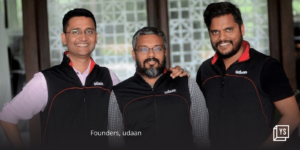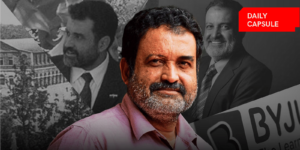The idea of starting a company has never been more popular in India. A new breed of entrepreneurs is rising in the country, inspired by home-grown heroes, driven to pursue extraordinary outcomes and supported by an ecosystem that is willing to back audacious ideas.
In writing Startup Compass, our aspiration was to try to glean insights on what it took to build a successful startup by examining the stories of how some of the most significant startups got built. Over the course of four years, we dug deep into the stories of several of the most celebrated startups built over the last decade, carried out extensive interviews, and focused our efforts on uncovering deep insights into the art of building a company.
In our book, we break down the journey of a startup across 10 stages, from the period before starting up, to thinking through an idea, building a team, launching a product, raising money, all the way to an exit, and look to learn from the perspectives and experiences of 15 stalwarts of the startup ecosystem in India – Abhiraj Singh Bhal (Urban Company), Anand Daniel (Accel India), Anu Hariharan (Y Combinator), Deep Kalra (MakeMyTrip), Falguni Nayar (Nykaa), Girish Mathrubootham (Freshworks), Kunal Shah (CRED), Raghunandan G (TaxiForSure, Zolve), Rajan Anandan (Sequoia India), Ritesh Agarwal (OYO Rooms), Sachin Bansal (Flipkart, Navi), Sanjeev Bikhchandani (Info Edge), Sahil Barua (Delhivery), Tarun Mehta (Ather Energy), and Yashish Dahiya (Policybazaar). It features a foreword by NR Narayana Murthy in which he speaks of his own experiences as an entrepreneur.
Each of them has carved out their path in their own way. Their perspectives, skills, and approaches would vary widely. However, during the course of writing the book, we realised that one of the threads common to the stories of many of the founders was their ability to take at least one specific trait to its pinnacle.
Role model for budding entrepreneurs
Padma Vibhushan NR Narayana Murthy, the founder and former Chairman of Infosys, needs no introduction. He founded Infosys at a time when the notion of entrepreneurship itself was little understood. Through building Infosys into an information technology giant, he offered a remarkable example of an Indian company being successful on a global stage. Through working with him, we came to observe devotion to perfection, even for what might be, for him, a relatively less consequential undertaking.
During the course of writing the foreword to the book, we were both inspired and stunned by the extent to which he devoted himself to the task. Not only did he willingly bring in great richness and depth by narrating learnings from his own extraordinary entrepreneurial career, he also brought a superlative degree of perfectionism to the exercise. He willingly shared several versions of the draft, continuously refining to iron out any flaws that he perceived. He took a great degree of interest in the editorial process. And showed a level of commitment that offered a powerful lesson in extreme ownership and perfectionism.
‘Discipline in depression’
In learning of MakeMyTrip’s early years, Deep Kalra and his co-founders’ resilience stands out in keeping the company afloat through trying circumstances. When the company was operating out of a tiny office in New Delhi’s Okhla Phase 1 in the early noughties, the founders would take calls from the US all night long, trying to sell tickets and hotel rooms to immigrant Indians travelling back from the US.
“When things get very tough, you can’t stop thinking about it,” Deep says. “The more you say to yourself “no thoughts”, the more thoughts come in, we all know that. So, it would show on our faces, and the rest of the team would pick up on what was going on.” And so one day, they made a rule: either they would be “in”, or they would quit, they decided. But if they decided to continue they would be “in” for a whole month. Once they had decided to persist, they would be in do so for a month and would not question themselves throughout the whole month. And then at the end of the month they would take stock.
At the end of every month, the founders would meet to decide whether they should continue for one more month. “This silly ritual kept us going for the good part of a year— eight, nine months at least; because instead of those months being 240 or 270 days, they actually became eight or nine discrete months,” Deep says. “And we had each other. That really helped. It helped us tide through a tough time,” he adds.
Their simple stratagem was so effective that they even came up with a name for it. “We called it ‘discipline in depression’,” Deep says. “I think it is really relevant when you are going through a tough time. You need your true north, you need someone to latch on to, you need to cry about your woes, but when you are in, you need to be disciplined.” This willingness to persist in the face of seemingly insurmountable challenges, through coming up with relatively simplistic gambit, offered an extraordinary study in resilience.
Finding your best-fit talent
Yashish Dahiya started in Policybazaar in 2008 following a conversation with his father which made him realise that there was a need for a comparison website for insurance policies. The company publicly listed in November last year.
What sets Yashish apart is his extreme focus on identifying and working with individuals with the right values. He considers poor hiring decisions to be amongst the most significant mistakes that he might have made in building the company. Most of these stemmed from hiring people who would seem to pass through objective filters of background and capabilities, but not necessarily for organisational fit, a far more subjective filter, he says. Almost always such hires would leave the organisation within two to three years.
Having faced the consequences of poor hiring decisions early on, he now ensures that the organisation takes into account the question of fit seriously. According to Yashish, if you are a perceptive person, you will pick it up in everything that a person does – the way they send you an e-mail, the way they make a phone call, even the way they write their CV.
How to make your best hires?
One of the primary traits that Yashish looks for is ‘a lack of selfishness’. If a person is constantly wondering where their career is headed, and what a company might do for them as opposed to how they could contribute, they will not necessarily be a very good hire, especially in a startup. “Because there will be ups and downs,” he says. Every time the company is not doing well, they will wonder what is in it for them. Such a person “will not have the ability to stick for the long run”.
Yashish’s willingness to focus on the innate values of a person is also reflected in senior hires that Policybazaar has made. In February 2020, Sarbvir Singh was appointed CEO of Policybazaar, with Yashish transitioning to chairman of the group. Despite Sarbvir’s limited experience in insurance, Yashish could trust him to be a good fit.
Yashish’s senior at IIT Delhi, Sarbvir was the sports secretary while Yashish was involved in running and swimming. “He used to come to me before every event and ask me about my plan for the event. I, on the other hand, would never have a plan. I would say something like, “Since this is a 1,500-metre race, I will run at a certain pace for the first 700 metres and then speed up. Everybody expects me to speed up at 1,100, but I will speed up earlier to build up my lead and eventually win,” he recalls.
“He always appreciated my plan, not once did he question it. Further, he would always stand at the 700-metre mark to ensure I didn’t miss it. At the 700-metre mark, he would clap once, “Okay, Yashish!” And every time he stood there, I never lost,” he adds. This willingness on Sarbvir’s part to truly care about someone else, to be entirely unselfish, stood out. When it came to deciding to work together, the choice was straightforward for Yashish.
Each of these entrepreneurs have traversed unique paths, and brought to bear unique skills in their extraordinary journeys. What stands out is their ability to take a certain skill and elevate it to an extreme. It is perhaps this that has allowed them to accomplish what they have.




![Read more about the article [Funding alert] Apollo.io raises $110M in Series C led by Sequoia Capital](https://blog.digitalsevaa.com/wp-content/uploads/2022/03/suvan1-1646372373567-300x150.png)

![Read more about the article [Budget 2022] Centre bats for digitisation of agriculture sector, launches agritech fund](https://blog.digitalsevaa.com/wp-content/uploads/2022/02/Featureimages-newdeck26-1643696907331-300x150.png)


![Read more about the article [Funding alert] Small business banking platform Novo raises $40.7M in Series A round](https://blog.digitalsevaa.com/wp-content/uploads/2021/06/Image5zim-1624426553948-300x150.jpg)
